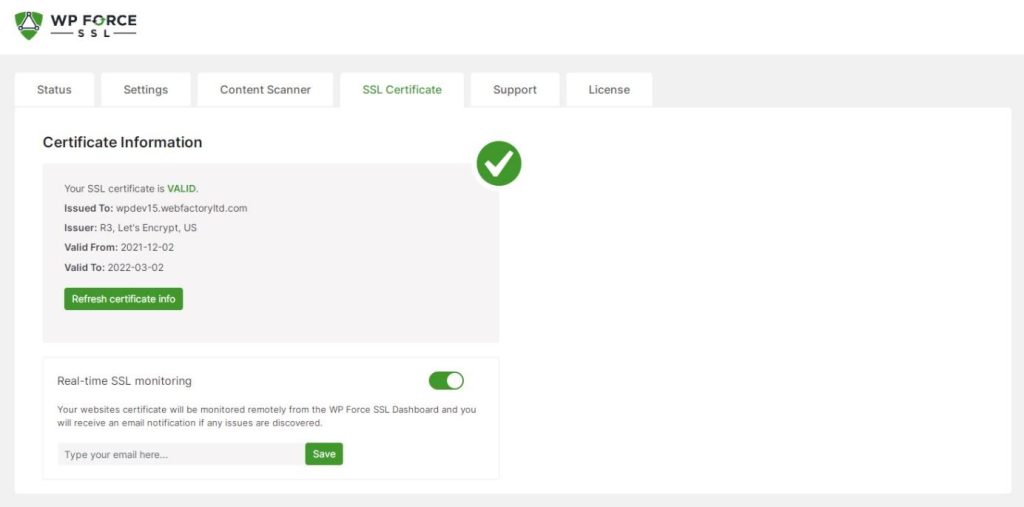How do you keep an eye on your SSL certificate on a WordPress site?
Whether you’ve done a business on the web or simply a user who consumes content, you’ve probably heard of the SSL certificate. Everybody “sort of” knows what the SSL certificate represents – something about a site’s security, but what is it all about.
Quick Links
The acronym SSL stands for Secure Sockets Layer. It’s been a mainstay and staple of online security for around 25 years. It has gone through a couple of versions in that time, becoming the primary way for browsers to distinguish safe sites from potentially dangerous ones.
The certificate has two primary purposes – identifying the site and enabling encrypted connections, both data coming from the users and the data on the pages themselves.

Every service and platform online seeks those valid certificates from browsers to Google, so a site must obtain one. If the certificate is valid, the user will freely access the site, but the browser automatically blocks the site if it’s not. The entire authentication process is done in the background and is entirely automated.
SSL or TLS?

While the term SSL is widely recognized, we can’t say the same for TLS. Transport Layer Security or TLS represents the upgraded version of the SSL (TLS is up to version 1.3) – they’re both designed to do the same thing, i.e., authenticate and encrypt data. However, the way each protocol encrypts data is different, with TLS being the much superior option.
It’s important to note that certificates and protocols aren’t the same. Because of, what can only be described as a colloquialism, the term “SSL certificate” has been engrained so much that it’s become the default designation, even though almost any relevant site uses TLS protocols within that “SSL” certificate. It’s been a point of interest around the web to correct the term and use TLS certificates, which is correct based on the underlying protocols, but it hasn’t really been that successful.
How to get an SSL certificate?
Obtaining an SSL certificate isn’t all that hard. You’ll usually get on for free with your hosting service. Alternatively, if you’re using WordPress, you can employ many plugins or use a service like Let’s Encrypt that offers free certificates. The choice on how to get a certification is mostly made for you. However, there’s something else you’ll have to account for. Namely, their expiration is critical to know about SSL certificates. For the certificates to be relevant, they need to be renewed periodically. Because of this, you need a system that will keep track of your certificate.
Monitoring your SSL

When taking care of your certificate status, it’s important to cover a wide variety of situations. There are numerous ways you can choose to keep your certificates in check, from handling them manually (not recommended) to a fully automated approach. A plugin like WP Force SSL automatically goes through the complete checklist of actions that ensure you won’t have any issues regarding SSL:
- Is the site on localhost – if a site is running only locally, there’s no need for a certificate, i.e., a test/staging site; once it goes live, you need one.
- Checking the SSL certificate and expiry date – rather self-explanatory, the plugin’s first thing is to check the SSL status. When it expires, you’re promptly notified of the latter automatically.
- Plugin-related SSL issues – the plugin checks for the latest version of WP Force SSL that’s available and checks for any other active SSL incompatible plugins you might have.
- Is the URL properly set up – both your WP address URL and WP home URL need to be set for SSL – WP Force SSL checks the status and enables you to take actions accordingly.
- SSL monitoring – the best feature you’ll find in the plugin – constant SSL monitoring in the background – we’ll get more into this quickly.
- Redirection status – the plugin checks if your HTTPS redirections and file redirections are working, as well as if 404 redirections are enabled
- If HSTS – an added security layer that requires secure connections (HTTPS) to access the site – is active and enabled, the browser will refuse all HTTP connections as a default setting.
- Mixed content – you might be in a situation where your site loads over an HTTPS connection, but multimedia content like images or videos continues to load through an HTTP connection – WP Force SSL enables you to circumvent the issue and mark the whole page as safe.
- Checking the .htaccess file – the plugin checks if the file is available and writable. Considering it’s your main WP configuration file, you wouldn’t want to mess with it, so it is advisable to let the plugin check everything by itself.

The main thing you want your SSL plugin to do is always know the certificate status. WP Force SSL is constantly working in the background (from the moment it’s activated), monitoring the status, notifying you if the certificate is about to expire or if one of over 50 documented errors pops up, ensuring you’re completely safe in every situation.
If you want to be extra sure everything’s in tip-top shape, you can also use the manual content scanner to eliminate mixed content errors. For example, your video files use the HTTP connection bringing your entire site, otherwise using the more secure HTTPS connection, down a level leaving it open to attack. You can identify the problem and bring everything up to HTTPS through the scanner.

Summary
Absolutely every site on the web is required to have an SSL certificate. As such, it’s essential to have the right tools that remove any potential issues you might have with your certificates. With WP Force SSL, you won’t be getting just a simple notification add-on but a way to automate the whole SSL process, which includes obtaining a certificate, as well as monitoring and maintaining it, most of which is done in the background without requiring any action on your part – the perfect solution.
How to Use AI-Powered SEO Tools for WordPress eCommerce
SEO is a critical factor in the success of any e-commerce WordPress store. As competition…
0 Comments11 Minutes
Why Short-Form Videos Are the Future of Content Marketing
Your Instagram customers spend over 50% of their time watching short-form videos and reels. Rather…
0 Comments12 Minutes
The Role of Digital Marketing in Business Growth
Online marketing touches every aspect of a business, whether it is initiating the idea or for an…
0 Comments3 Minutes
AI Meets Authenticity: Balancing Automation and Human Touch in Content Marketing
Is your brand starting to sound like a robot? In a world where algorithms write faster than any…
0 Comments8 Minutes
Essential Tools for Enhancing Web Design and UX Hosting
Have you ever visited a website that felt slow, clunky, or confusing? A website that is poorly…
0 Comments11 Minutes
How a Mini Cart Transformed My Store’s Shopping Experience
Okay, real talk—running an online store is hard. You think you’ve got everything figured out, you…
0 Comments9 Minutes
Balancing Your Security Initiatives With Industry Compliance Requirements
Managing a business today comes with a number of daily battles that need to be fought. Resources…
0 Comments11 Minutes
Best plugins to enhance the customer shopping experience
Customer experience is a key part of every online store. A good experience helps customers find…
0 Comments7 Minutes








